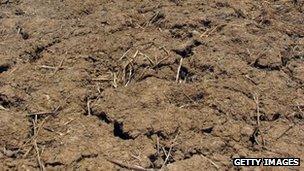Redefine concept of drought, Environment Agency urges
- Published

Does our idea of drought fit with what we are experiencing in parts of England?
Policy makers should drop "drought" as a blanket term and move to a sliding scale to describe dry conditions, the Environment Agency says.
This would help distinguish small environmental impacts from emergencies that require drought orders, it said.
It said "refinement" was needed to guide people on what action was needed.
Recent relabelling of some English counties, from drought status to being environmentally stressed, reflected this approach, the agency added.
Ten days ago drought status was lifted in 19 areas of south-west England, the Midlands and parts of Yorkshire following persistent rainfall last month - the wettest April on record. These areas are now considered to be in "environmental stress due to rainfall deficit".
Areas across the south-east and east of England remain in drought, with hosepipe bans in place.
<bold>Sliding scale</bold>
The perceived problem with the word drought is that, for many, it conjures up the dry cracked land that can be found in dry parts of the world, which is at odds with green countryside. The Environment Agency hopes that a new approach to describing the lack of rainfall in England could help inform people if action is needed.
Trevor Bishop, head of water resources at the Environment Agency, told a media briefing in London: "Drought is a very blunt term. It encompasses everything from salmon having a little trouble moving up river, to hosepipe bans and drought orders. We need to show the gradation from something that is less serious to situations where farmers and economics are impacted.
"We need refinement to help inform those who are affected and guide them on how to act.
"The jury is still out on what terms we will use, but it will probably be a nuance of what we have just currently implemented."
The reconsideration of the term drought is being led by the Environment Agency in collaboration with the National Drought Group, which includes the Met Office, Defra, and Natural England.
<bold>April showers</bold>
The Environment Agency predicts that water companies will not need to step up their current water restrictions this summer, with the wet April helping to recharge chalk aquifers in the south east.
Mr Bishop said: "We were surprised how the water in these aquifers has increased. They are still chronically deficient - but the rain has helped. We won't know by how much until all the water has seeped down - this might take a few weeks."
So far this month, from 1-15 May, the UK has had 52mm of rain according to provisional figures from the Met Office. The average monthly rainfall for May is 66mm.
However, a Met Office spokesperson says that much rainfall is not unusual, as May tends to be "a month of two halves". He explained: "The month of May has been on the unsettled side but it looks as if the second half of the month will turn out drier, brighter and a bit warmer too."
- Published11 May 2012
- Published21 May 2012